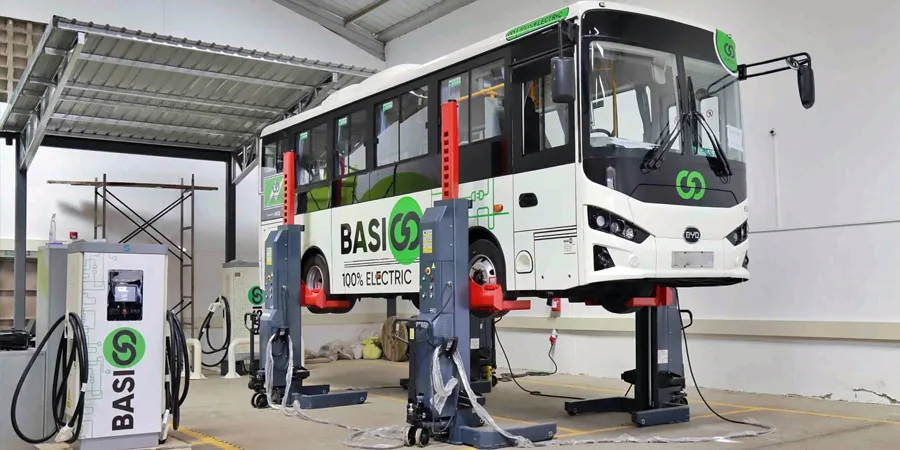BasiGo has opened three new charging depots in Komarock, Taj Mall (Pipeline), and Riruta, significantly expanding the backbone of Nairobi’s fast-growing e-bus ecosystem.
The rollout alongside a fourth depot planned for Juja by December boosts capacity for a fleet now surpassing 100 electric buses.
Since launching in 2022, BasiGo’s vehicles have logged more than one million kilometres and carried over 300,000 passengers.
For matatu operators, the informal but essential engine of Nairobi’s daily commute, these sites represent more than additional charging points.
They reduce operating costs, improve fleet reliability and strengthen the economics of zero-emission transport in a city long constrained by diesel-driven congestion and pollution.
As Kenya pursues its National E-Mobility Strategy target of 5% EV adoption by 2025 and advances Vision 2030’s sustainable mobility agenda, BasiGo’s infrastructure expansion cements Nairobi’s position as East Africa’s e-bus leader.
But the practical question remains: what will this mean for operators on the ground? Lower and more predictable expenses, fewer breakdowns, and a clearer route to profitability.
BasiGo’s Backbone: From Fleet Provider to Full Ecosystem
Founded in 2021 by Jonathan Green and Ridahwan Adebayo, BasiGo entered the market with a Pay-As-You-Drive (PAYD) model designed to make e-bus ownership accessible.
Instead of heavy upfront costs, operators pay around KSh 5,000 ($38) per day, which covers the bus, charging, maintenance and insurance across a 15-year lifecycle.
The company has raised $54 million in equity and debt, including a $42 million Series A in 2024 from Africa50, CFAO and Novastar. Local assembly, done in partnership with King Long, ramped up further in 2025 with deployment of the KL-9 model.
The new depots shift BasiGo from a vehicle supplier to a full-service operator. Each site uses 160 kW DC fast chargers supporting GB/T and CCS2 standards, with the capacity to sequentially charge 20–30 buses.
Combined, they support up to 100 buses per day, currently the largest e-bus charging network in Kenya.
Taj Mall serves as the flagship location, doubling as a Service & Customer Excellence Centre with CATL battery diagnostics, on-site repairs and operator training aimed at maintaining 99% fleet uptime.
Komarock and Riruta are positioned along high-demand routes to minimise dead mileage and keep buses in service during peak hours.
Earlier hubs in Embakasi, Kikuyu and Buruburu validated this operational model after launching in 2023. The latest expansion comes as BasiGo scales toward 130 buses by year-end.
Supported by Kenya Power’s e-mobility tariff of roughly KSh 15/kWh off-peak, the depots take advantage of nighttime grid surplus, helping reduce renewable-energy limitation and avoiding daytime tariffs that are 20–30% higher.
The Operator Edge: Lower Costs, Higher Reliability, Better Returns
For matatu Saccos such as OMA Services or Embassava, which often manage fleets of 5–20 vehicles, the economics are compelling. Diesel matatus typically burn KSh 20,000–30,000 ($150–230) per week on fuel.
BasiGo’s electric buses cut that burden in half, with electricity costs averaging KSh 10–15 per kilometre compared with KSh 25–30 for diesel.
Daily PAYD fees also shield operators from volatile fuel prices, which climbed 15% in 2025 amid global oil fluctuations.
Reliability is equally critical. Diesel-related breakdowns routinely idle up to 20% of matatu fleets weekly, costing operators more than KSh 10,000 ($75) per day in lost revenue.
READ ALSO:
Why Kenya’s BasiGo Could Redefine Africa’s Public Transport Forever
With centralised service, overnight charging and CATL-trained technicians at Taj Mall, BasiGo maintains 90–99% uptime, significantly reducing downtime losses.
The company has created more than 300 green jobs to support operations and maintenance, boosting local skills in high-voltage systems and battery diagnostics.
Each e-bus avoids roughly 30 tonnes of CO₂ annually; collectively, the fleet’s emissions savings exceed 1,500 tonnes a year, supporting Kenya’s target of a 32% emissions reduction by 2030.
Operators also benefit from cleaner, quieter rides that improve passenger experience and can lift ridership by 10–15%. Eligibility for EV-related incentives further strengthens returns on investment.
“We’re building the backbone for electric public transport,” said BasiGo Kenya Managing Director Moses Nderitu. “Rapid charging, localised service and reliability give operators the confidence to go green.”
Kenya Power CEO Dr Joseph Siror added, “Our grid is ready. Partnerships like BasiGo’s drive clean, sustainable mobility for all Kenyans.”
Depot Benefits for Operators
| Depot | Daily Bus Capacity | Key Features | Cost Reduction | Job / Training Impact |
|---|---|---|---|---|
| Komarock | 20–25 | Route-aligned fast charging | KSh 10–15/km electricity | Local hires |
| Taj Mall | 25–30 (plus service) | CATL diagnostics, operator training | Maintenance bundled in PAYD | Excellence Centre staffing |
| Riruta | 20–25 | High-traffic corridor access | Minimal downtime losses | Operator advisors |
| Network Total | Up to 100 buses | 99% uptime; off-peak tariffs | 50%+ savings vs diesel | 300+ green jobs created |
Based on BasiGo specifications and EPRA 2025 data, estimates are for a 20-bus Sacco.
Electrifying the Matatu Mainstream
For operators, BasiGo’s new depots offer a reliable, affordable operating base for the future of public transport. In a city where matatus move roughly 70% of commuters, this infrastructure transforms electric mobility from niche to mainstream.
With Juja on track to join the network next, Nairobi’s e-bus revolution is accelerating one depot and one route at a time.
BasiGo Overview
BasiGo Kenya has become a key player in the push for electric public transport, drawing interest from investors, job-seekers, and transport operators alike.
Many people start by looking for the official BasiGo email address or BasiGo postal address so they can reach the company for partnerships, fleet enquiries, or service support.
With operations expanding rapidly, the company’s growing team and Nairobi hub have made the main BasiGo location an important reference point for visitors and applicants.
As the company scales, opportunities within BasiGo Careers continue to grow, and students keep an eye out for the BasiGo internship as a gateway into Kenya’s fast-evolving EV sector.
Naturally, job-seekers often ask about BasiGo salary in Kenya to understand compensation across technical, engineering, and administrative roles.
On the transport side, operators and SACCOs frequently search for the Basigo price in Kenya, especially as more electric buses enter the market through BasiGo’s pay-as-you-drive model.
With rising demand and a solid footing in Nairobi, BasiGo is steadily positioning itself at the centre of Kenya’s clean-mobility transformation.
Ronnie Paul is a seasoned writer and analyst with a prolific portfolio of over 1,000 published articles, specialising in fintech, cryptocurrency, climate change, and digital finance at Africa Digest News.






